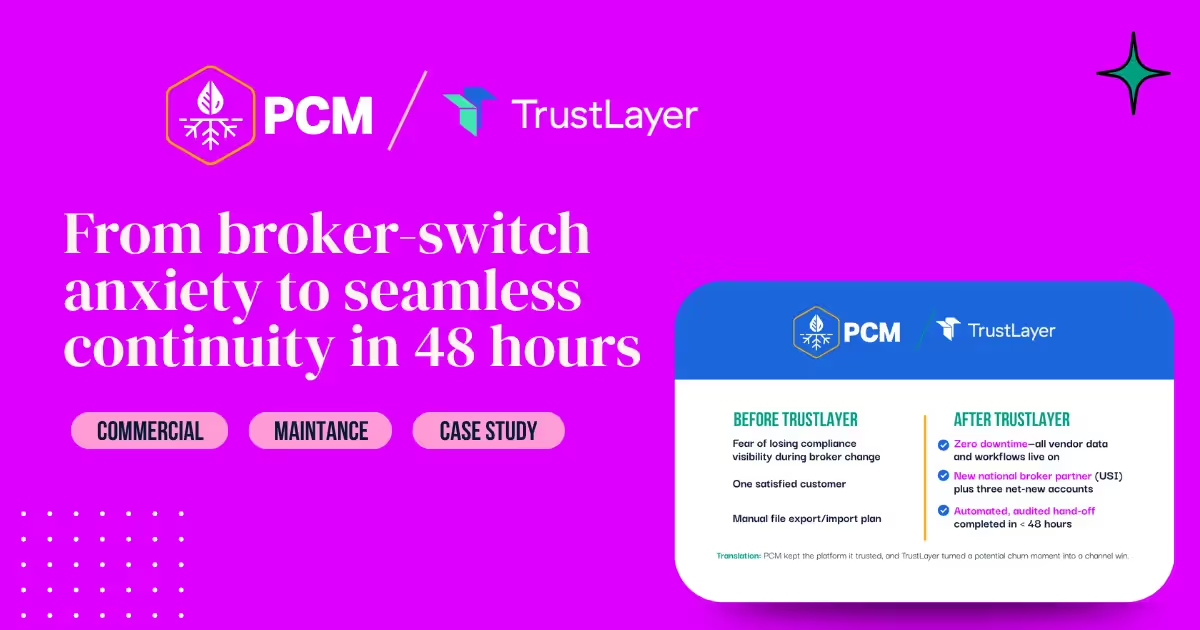The Impact of Insurance Tracking Software in Small Businesses
In today's rapidly evolving business landscape, small businesses face a multitude of challenges, from managing day-to-day operations to fulfilling legal and regulatory requirements. Insurance is an essential aspect of any business, safeguarding against unexpected risks and providing much-needed peace of mind. However, keeping track of insurance policies, verifying coverage, and ensuring compliance can be a daunting task for small business owners. This is where insurance tracking software comes into play, revolutionizing the way small businesses manage their insurance needs.
Understanding Insurance Tracking Software
Insurance tracking software is a game-changer for small businesses, providing a centralized platform to manage and track insurance policies. By automating the process, businesses can streamline insurance management, saving time, reducing administrative burdens, and minimizing the risk of non-compliance or gaps in coverage.
With the ever-increasing complexity of insurance policies and regulations, businesses need a reliable solution to keep track of their insurance coverage. Insurance tracking software offers a comprehensive solution that brings together all the necessary tools and features to effectively manage insurance policies.
Key Features of Insurance Tracking Software
Modern insurance tracking software comes equipped with a range of powerful features that simplify the entire insurance management process. These features include:
- Automated Policy Verification: Insurance tracking software automates the verification of insurance policies, making it easier for businesses to ensure coverage and compliance. This feature eliminates the need for manual checks and reduces the risk of human error.
- Real-time Updates: With real-time updates, businesses can stay informed about changes in policy status, ensuring that they are always up to date. Whether it's a policy renewal, cancellation, or modification, the software provides instant notifications, keeping businesses in the loop.
- Document Management: Insurance tracking software allows businesses to store and manage important insurance documents securely, eliminating the need for physical copies. With a centralized repository, businesses can easily access and retrieve policy documents whenever needed, saving time and reducing paperwork.
- Reporting and Analytics: Advanced reporting and analytics capabilities provide valuable insights into insurance trends and help businesses identify potential areas for improvement. With customizable reports and data visualization tools, businesses can analyze their insurance data to make informed decisions and optimize their coverage.
These features work in harmony to provide businesses with a comprehensive insurance management solution. By leveraging automation and technology, insurance tracking software simplifies the entire process, empowering businesses to focus on their core operations.
How Insurance Tracking Software Works
Insurance tracking software works by integrating with insurance carriers and agencies, allowing businesses to pull up-to-date policy information directly into the software. The software then automates the verification process, ensuring that policies are valid and providing businesses with real-time visibility into their insurance coverage.
When a business enters its insurance policy details into the software, the system establishes a connection with the insurance carrier's database. It retrieves the policy information, including coverage limits, effective dates, and any endorsements or exclusions. The software then cross-references this information with the business's requirements and compliance standards.
If any discrepancies or issues are detected, the software generates alerts or notifications, prompting the business to take necessary actions. This proactive approach helps businesses identify and resolve potential gaps in coverage, ensuring they remain compliant and adequately protected.
Moreover, insurance tracking software also simplifies the renewal process. It sends automated reminders to businesses, notifying them about upcoming policy renewals. This feature helps businesses stay on top of their insurance obligations and avoid any lapses in coverage.
In conclusion, insurance tracking software is a vital tool for small businesses to effectively manage and track their insurance policies. With its advanced features and automation capabilities, it simplifies the entire insurance management process, providing businesses with peace of mind and ensuring they remain compliant and adequately protected.
The Role of Insurance Tracking Software in Small Businesses
Small businesses often struggle to keep up with the ever-changing insurance landscape. Manual processes, such as managing paper certificates of insurance, can be time-consuming and prone to errors. Insurance tracking software steps in as a strategic solution, offering numerous benefits to small businesses.
Streamlining Insurance Management Processes
Traditionally, managing insurance policies involved sifting through piles of paperwork, making phone calls, and manually verifying coverage. Not only was this process time-consuming, but it also left room for human error. Insurance tracking software simplifies these tasks, centralizing policy information and automating the verification process. This streamlines insurance management, freeing up valuable time for small business owners and employees.
With insurance tracking software, small businesses can easily access and update policy information in one centralized location. The software provides a user-friendly interface that allows businesses to input and store policy details, including coverage limits, deductibles, and contact information for insurance providers. This centralized approach eliminates the need for physical paperwork and reduces the risk of misplacing important insurance documents.
Furthermore, insurance tracking software automates the verification process, ensuring that policies are up to date and compliant with industry standards. The software can automatically send reminders to policyholders when renewal dates are approaching, reducing the chances of coverage lapses. This proactive approach eliminates the need for manual follow-ups and reduces the risk of non-compliance.
Enhancing Compliance and Risk Management
Compliance with insurance requirements is essential for small businesses, as non-compliance can result in costly fines and legal consequences. Insurance tracking software plays a crucial role in ensuring compliance by automatically monitoring policy expiration dates, coverage limits, and compliance with regulatory frameworks. By proactively addressing these factors, businesses can reduce their exposure to risk and avoid potential legal pitfalls.
Insurance tracking software provides small businesses with real-time insights into their insurance coverage. The software can generate reports and analytics that highlight any gaps or deficiencies in the existing insurance policies. This allows businesses to identify areas of potential risk and take necessary measures to mitigate them.
Moreover, insurance tracking software can integrate with other risk management tools, such as claims management systems and incident reporting platforms. This integration enables businesses to streamline their risk management processes, ensuring that insurance claims are handled efficiently and incidents are reported promptly. By having a comprehensive risk management system in place, small businesses can protect their assets and minimize financial losses.
In addition to compliance and risk management, insurance tracking software also provides small businesses with valuable insights into their insurance spending. The software can analyze insurance data and identify cost-saving opportunities, such as negotiating better rates with insurance providers or adjusting coverage levels based on actual needs. This data-driven approach allows businesses to optimize their insurance strategies and allocate their resources effectively.
In conclusion, insurance tracking software offers small businesses a comprehensive solution for managing their insurance policies. By streamlining insurance management processes and enhancing compliance and risk management, this software empowers businesses to navigate the complex insurance landscape with ease. With the ability to centralize policy information, automate verification processes, and gain valuable insights, small businesses can focus on their core operations while ensuring they have the necessary insurance coverage to protect their assets.
Benefits of Implementing Insurance Tracking Software
The benefits of implementing insurance tracking software in small businesses are far-reaching, transforming the way insurance is managed and creating a more efficient and productive workflow.
Implementing insurance tracking software not only streamlines insurance management but also brings several other advantages to small businesses. Let's explore some of these benefits in more detail:
Cost Efficiency and Savings
Manual insurance management is not only time-consuming but also costly. Personnel dedicated to insurance-related tasks and potential errors can drain resources. Insurance tracking software eliminates the need for such labor-intensive processes, reducing administrative costs and increasing efficiency.
By automating insurance tracking, small businesses can save both time and money. The software takes care of the tedious tasks, such as policy renewals and coverage gaps, allowing employees to focus on more strategic and revenue-generating activities. This redirection of resources towards core business activities drives growth and profitability.
Improved Accuracy and Productivity
Insurance tracking software drastically reduces the chances of errors, such as overlooking policy renewals or gaps in coverage. With automated features and real-time updates, businesses can ensure the accuracy and completeness of their insurance records.
By having a centralized system that tracks all insurance policies, small businesses can avoid costly mistakes and potential legal issues. The software sends timely reminders for policy renewals, ensuring that coverage remains uninterrupted. This improved accuracy translates into enhanced productivity, allowing businesses to focus on their core competencies confidently.
Moreover, insurance tracking software provides businesses with comprehensive reports and analytics, enabling them to make informed decisions. By analyzing data on insurance coverage, claims, and premiums, small businesses can identify trends, optimize their insurance strategies, and negotiate better rates with insurers.
In conclusion, implementing insurance tracking software brings numerous benefits to small businesses. From cost efficiency and savings to improved accuracy and productivity, the software revolutionizes insurance management. By leveraging automation and real-time updates, small businesses can streamline their insurance processes, reduce administrative costs, and focus on their core competencies, ultimately driving growth and profitability.
Potential Challenges in Adopting Insurance Tracking Software
While the benefits of insurance tracking software are evident, small businesses may face challenges during the adoption and implementation stage. Being aware of these challenges is crucial to overcome them successfully.
Implementing insurance tracking software in a small business environment can bring about a variety of challenges that need to be addressed. Let's explore some of these challenges in more detail:
Training and Adaptation Issues
Introducing new software to an organization requires proper training and adaptation. Employees may initially struggle with the transition from manual processes to an automated system. It is essential to provide comprehensive training sessions to familiarize employees with the software's features and functionalities. By investing time and resources into training, businesses can ensure a smooth transition and minimize any potential disruptions to daily operations.
Moreover, it is crucial to create a supportive environment where employees feel comfortable asking questions and seeking assistance during the learning process. This can be achieved by appointing dedicated trainers or providing access to online tutorials and resources. With adequate training and support, employees can quickly adapt to the software and harness its full potential, leading to increased efficiency and productivity.
Addressing Security and Privacy Concerns
Managing sensitive insurance information brings forth concerns about data security and privacy. Small businesses must select insurance tracking software that offers robust security measures, such as encryption and user access controls. It is essential to thoroughly evaluate the software provider's security protocols and ensure they comply with industry standards and regulations.
Additionally, businesses should establish clear policies and procedures regarding data handling and access. This includes implementing strong password policies, regularly updating software and security patches, and conducting periodic security audits. By addressing these concerns upfront and choosing a reputable software provider, businesses can ensure the safety and confidentiality of their insurance data, mitigating the risk of data breaches and unauthorized access.
Furthermore, it is essential to educate employees about the importance of data security and privacy. This can be done through training sessions or informative materials that highlight best practices for handling sensitive information. By fostering a culture of data security awareness, businesses can empower their employees to be vigilant and proactive in protecting valuable insurance data.
Overall, while adopting insurance tracking software may present certain challenges, they can be overcome with careful planning, effective training, and a focus on security and privacy. By addressing these challenges head-on, small businesses can reap the benefits of streamlined insurance management and improved operational efficiency.
Choosing the Right Insurance Tracking Software for Your Business
Not all insurance tracking software solutions are created equal. When selecting the right software for your business, it's essential to consider various factors to ensure a seamless integration and optimal performance.
Factors to Consider
Key factors to consider when choosing insurance tracking software include:
- User-Friendly Interface: The software should have an intuitive and user-friendly interface, allowing for easy navigation and adoption.
- Integration Capabilities: Ensure that the software integrates seamlessly with other systems your business uses, such as accounting or project management software.
- Customer Support: Look for a software provider that offers responsive customer support, as prompt assistance can be critical in resolving any issues or concerns.
Evaluating Different Software Options
Take the time to thoroughly evaluate different insurance tracking software options available in the market. Read customer reviews, request product demonstrations, and consider the reputation and expertise of the software provider. One prominent and trusted solution in the industry is TrustLayer, which offers a comprehensive insurance tracking software suitable for small businesses.
In conclusion, insurance tracking software has a profound impact on small businesses, enabling them to efficiently manage their insurance needs, enhance compliance, and drive cost savings. By harnessing the power of automation and real-time updates, small businesses can focus on what they do best, knowing that their insurance coverage is up to date and comprehensive. When considering an insurance tracking software solution, evaluating various software options and selecting a reputable provider like TrustLayer will set your small business on the path to success.
















